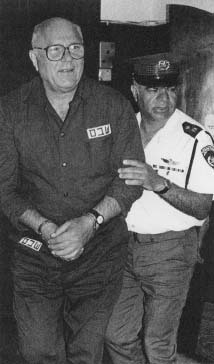John Demjanjuk Denaturalization Trial: 1981
Holocaust Survivors Testify
Next came the victims of Ivan the Terrible's barbarism. Of more than a million prisoners who passed through the gates of Treblinka, fewer than 60 survived to tell the world of the horrors it had housed. Of that 60, only five were left. Four had flown half-way around the world, prepared to swear John Demjanjuk was indeed Ivan the Terrible.
Yehiel Reichman, 65, had seen Ivan daily at Treblinka and had no difficulty in identifying Demjanjuk. Similarly, Pinhas Epstein described Ivan "a big, thickset man" who operated the diesel engine that pumped deadly carbon monoxide into the gas chambers. He also saw Ivan beat prisoners to death with a lead pipe.
 Demjanjuk is escorted into Israel's supreme court.
Demjanjuk is escorted into Israel's supreme court.
Others followed, including Eliahu Rosenberg, who had worked as corpse carrier, clearing the chambers of dead bodies, and Sonia Lewkowicz, a laundress. All had tales to tell, and all identified Demjamjuk as the demon who had murdered thousands. Try as he might, defense counsel John Martin could not budge any of them.
When it came time to testify on his own behalf, Demjanjuk did so briefly and in Ukrainian. His defense was that he had never been at Treblinka at all: it was all a case of mistaken identity. He dismissed the ID card as a KGB forgery (the card had originally surfaced in the Soviet Union). According to Demjanjuk, throughout 1942-43 he was an imprisoned Soviet soldier at a German POW camp at Chelm in Poland.
The testimony was heard by Judge Frank Battisti, sitting alone without a jury. After lengthy deliberation, in a 44delivered decision Battisti found on page had illegally naturalization June 23, 1981, by Judge that Demjanjuk record and concealing obtained U.S. wartime his ordered the immediate revocation of his citizenship.
This opened the door for deportation proceedings. Appeals delayed the process until May 23, 1984, when Demjanjuk was given 30 days to leave the country voluntarily. He chose to stay and fight. In February 1985 the INS Board of Appeals ruled that Demjanjuk's background denied him the privilege of voluntary departure and he was imprisoned to await the results of an extradition request made by Israel. On February 27, 1986, Demjanjuk was escorted by two U.S. marshals onto an El Al 747, Israeli airlines jet, bound for Tel Aviv.
Additional topics
Law Library - American Law and Legal InformationNotable Trials and Court Cases - 1981 to 1988John Demjanjuk Denaturalization Trial: 1981 - Holocaust Survivors Testify, Sentenced To Death